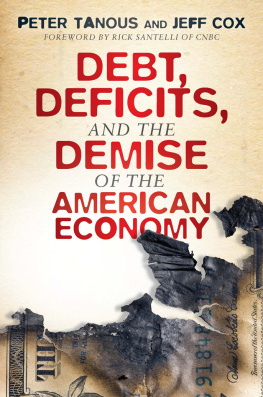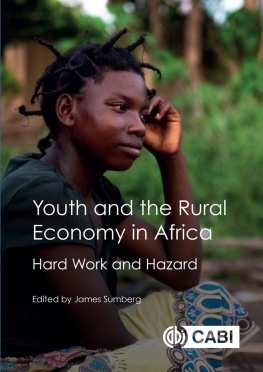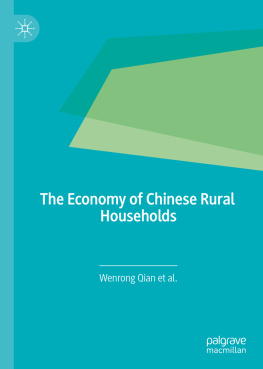Routledge Library Editions
THE DEMISE OF A
RURAL ECONOMY
ANTHROPOLOGY AND ETHNOGRAPHY
Routledge Library Editions
Anthropology and Ethnography
SOUTH AMERICA
In 4 Volumes
| I | The Demise of a Rural Economy | Gudeman |
| II | Relationships, Residence and the Individual | Gudeman |
| III | Indians of the Andes | Osborne |
| IV | The People of Aritama | Reichel-Dolmatoff |
THE DEMISE OF A
RURAL ECONOMY
From Subsistence to Capitalism
in a Latin American Village
STEPHEN GUDEMAN
First published in 1978
Reprinted in 2004 by
Routledge
2 Park Square, Milton Park, Abingdon, Oxon, OX14 4RN
Transferred to Digital Printing 2006
Routledge is an imprint of the Taylor & Francis Group
1978 Stephen Gudeman
All rights reserved. No part of this book may be reprinted or reproduced or utilized in any form or by any electronic, mechanical, or other means, now known or hereafter invented, including photocopying and recording, or in any information storage or retrieval system, without permission in writing from the publishers.
The publishers have made every effort to contact authors/copyright holders of the works reprinted in Routledge Library Editions Anthropology and Ethnography. This has not been possible in every case, however, and we would welcome correspondence from those individuals/companies we have been unable to trace.
These reprints are taken from original copies of each book. In many cases the condition of these originals is not perfect. The publisher has gone to great lengths to ensure the quality of these reprints, but wishes to point out that certain characteristics of the original copies will, of necessity, be apparent in reprints thereof.
British Library Cataloguing in Publication Data
A CIP catalogue record for this book is available from the British Library
The Demise of a Rural Economy
ISBN 978-0-415-33042-8
Miniset: South America
Series: Routledge Library Editions Anthropology and Ethnography
The demise of a rural economy
From subsistence to capitalism in
a Latin American village
Stephen Gudeman
Department of Anthropology
University of Minnesota
Routledge & Kegan Paul
London, Henley and Boston
First published in 1978
by Routledge & Kegan Paul Ltd
39 Store Street,
London WC1E 7DD,
Broadway House,
Newtown Road,
Henley-on-Thames,
Oxon RG9 1EN and
9 Park Street,
Boston, Mass. 02108, USA
Set in 10 on 12 point Compugraphic English Times
The Trinity Press, Worcester, and London
Copyright Stephen Gudeman 1978
No part of this book may be reproduced in
any form without permission from the
publisher, except for the quotation of brief
passages in criticism
British Library Cataloguing in Publication Data
Gudeman, Stephen
The demise of a rural economy.(International library of anthropology).
1. Latin AmericaEconomic conditions1945
2. Latin AmericaRural conditions
I. Title II. Series
330.98003 HC125
ISBN 0 7100 8835 3
ISBN 0 7100 8836 1 Pbk
Illustrations
Map
Tables
Figures
I have a story to relate about a rural economy in Latin America. At its simplest the plot concerns the way in which the people of a small Panamanian village began to leave aside planting rice and maize in order to accommodate a new crop, sugar cane. But this crop change entailed more than a reorganization of agricultural practices: the introduction of sugar cane represented a transition from subsistence farming to cash cropping, and this agricultural reorientation itself presaged a total transformation of the peoples economy. Thus, more broadly, my narrative is about a rural economy caught in the moment of transition between two competitive forms of organization, production for use and production for exchange. Further, not only were these two patterns of production historically related, but the change from the one to the other was a consequence of forces emanating from without the immediate village. Perforce, an account of the local economy must stretch in time and space beyond the geographic borders of its ostensible subject. My story, then, revolves about a subsistence economy: to inquire into its essence is also to ask how it was generated by and maintained on the margins of a different economy, eventually to be absorbed by that larger system.
The concepts of economic anthropology hardly provide the means for relating this brief tale. The debate between the formalists and the substantivists, that acrimonious discussion frequently unrelated to ethnographic facts, has so numbed the entire field it scarcely seems that an anthropological economics is possible. The substantivists may have over-emphasized the domain of transactions, but the byway of the formalists is more treacherous, for they have abstracted from the entire history of economic thought one period, which lies roughly between Marx and Keynes, and raised it to the level of universality.
From one viewpoint both approaches have obscured the essential. Hidden by the smoke of the battle is the fundamental fact that both sides agree on the starting place for analysis: exchange relations. Ultimately, this leads both to encounter difficulties in conceptualizing the economy in relation to society, and aligns both with the same broad tradition in economics.
Since the apparatus of the formalists has been taken with some emendations from neoclassical economics, since their key text appears to be a short essay by Lord Robbins (1932), their interest inevitably is focused upon decision making and the rationality of human beings as they meet to exchange. But by starting with the assumption that everywhere means are finite while ends unlimited, the formalists have achieved the dual victory of universalizing economics to the point of absorbing all other forms of human activity while denying the anthropological premise. Humans do make decisions - Malinowski long ago suggested that rules and actions do not always coincide - but when the anthropologist becomes so infected with the study of decision making (Ortiz, 1973), when the economy, pace Adam Smith, is reduced to an aggregate of individual decisions, the anthropological perspective has been lost. Taking individuals, or elements, rather than groups, or systems, as the place of departure is to mistake result for cause, a fact long ago argued by Durkheim. Seemingly, the formalists would deny that an economy is a specific, determinant system, a system which is reducible neither to individual volition nor to a reflection of the formalists own real-life experience.
Paradoxically, the same broad critique holds for the substantivists, for their principal theoretical propositions - some might say their only - concern exchange. For Polanyi (1968: 1489) the way into an economy was to locate first its primary form of integration, which had to be reciprocity, redistribution or exchange (meaning for Polanyi market relations). Indeed, one is tempted to go further and suggest that if one element of a true substantivism consists in the appreciation and use of native categories, then the substantivists have betrayed their own origins and cause by emphasizing modes of integration. Anxious as they are to display the social origins of the economy, the substantivists, because they commence with exchange, are forced to reinsert the economy in the society after first extracting it.







